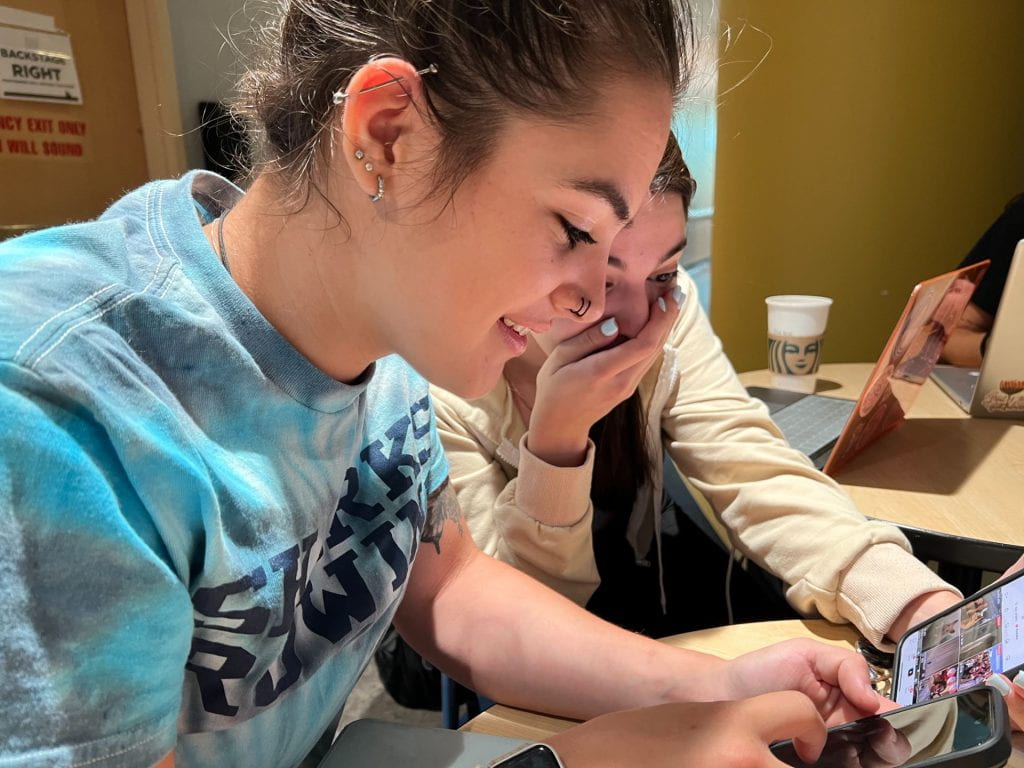
PHOTO BY FRANCESCA ABARCA
Ysabel Ribeiro, senior exercise sport science major, and Daphne Hernandez, junior biology major, scroll through TikTok.
On March 25, Gov. Ron DeSantis signed House Bill 3, which would ban children under 14 from using social media. The bill will go into effect on Jan. 1, 2025.
Parents will have to give consent for 14- and 15-year-olds to create accounts, while children younger than 14 are banned from social media.
HB3 is an amended version of HB1, which DeSantis vetoed on March 1 because he had questions about the bill’s constitutionality and whether it infringed on parental rights with its total ban on social media accounts for teens under 16.
“Protecting children from harms associated with social media is important, as is supporting parents’ rights and maintaining the ability of adults to engage in anonymous speech,” DeSantis posted on X.
HB1 would have required owners of new and existing social media accounts to go through age verification processes, such as uploading government-issued identification.
With HB3, age verification will not be required for adults creating new accounts. The bill also includes age verification requirements for pornography websites, which were not included in HB1.
“I don’t think it’s enough. I don’t think changing the age requirement is going to create the appropriate wall that we need for protecting our children,” Christi Navarro, assistant professor in the Department of Public Health, said.
With HB3 signed into law, parents will be able to request their children’s profiles be terminated, even if they are in compliance with the platforms’ age requirements. HB3 will also permit the state to recoup civil penalties up to $50,000, as well as court costs and attorney fees.
“They’ve done this with smoking, they’ve done this with vaping, they’ve done this with alcohol. If they want to be online, kids are going to find their way online,” she said.
Navarro thinks the ban is a government overreach that would be impossible to enforce.
“I just feel like there’s going to be so many ways people are going to get around it. There has to be some better ways of monitoring what happens online, and I think the technology is there,” Navarro said.
David Angel, NSU 2023 public health alumnus, used social media to communicate with the outside world after facing abuse at home. He spent his adolescence in a religious cult and wasn’t allowed to use social media.
“We had to stay away from the world because the world was full of sin. Social media and other things like that were very taboo. It was restricted because everyone saw it as a bad thing,” Angel said.
Angel found solace through running the former Instagram page “AC Guy.” Students sent anonymous complaints and confessions about NSU, and Angel posted their messages to the Instagram page. “AC Guy” had more than 1,200 followers.
“I definitely credit a lot of my personality now, a lot of my friendships, relationships and experiences to ‘AC Guy,’” Angel said. “It gave me a voice. It gave me a community.”
Angel opposes the legislation, calling social media useful.
“It’s not just for wasting time and doing TikTok dances. It’s not a necessity, but people need to stay connected. I definitely think it’s useful for kids who grew up like I did,” Angel said.
Utah, Arkansas, Louisiana, Ohio and Texas have similar legislation pending. There are concerns that the bill violates the First Amendment. Technology companies are expected to challenge the bill in court.

Be the first to comment on "Florida limits minors’ access to social media"